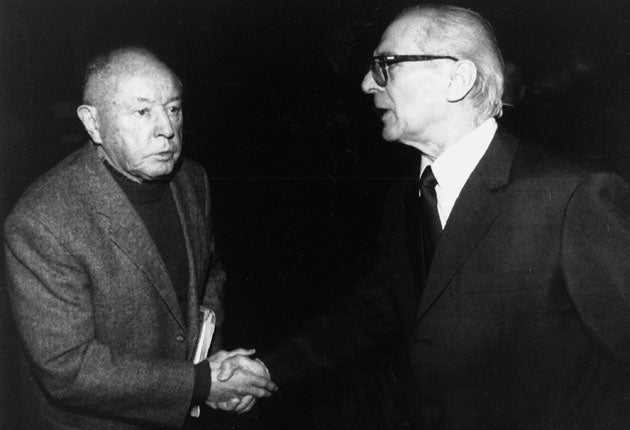Honecker was forced to resign by secret police
Stasi chief held file revealing East German premier's Nazi links

Your support helps us to tell the story
From reproductive rights to climate change to Big Tech, The Independent is on the ground when the story is developing. Whether it's investigating the financials of Elon Musk's pro-Trump PAC or producing our latest documentary, 'The A Word', which shines a light on the American women fighting for reproductive rights, we know how important it is to parse out the facts from the messaging.
At such a critical moment in US history, we need reporters on the ground. Your donation allows us to keep sending journalists to speak to both sides of the story.
The Independent is trusted by Americans across the entire political spectrum. And unlike many other quality news outlets, we choose not to lock Americans out of our reporting and analysis with paywalls. We believe quality journalism should be available to everyone, paid for by those who can afford it.
Your support makes all the difference.The Stasi, the omnipotent Ministry for State Security in the former East Germany, kept a secret dossier on the country's once revered leader, Erich Honecker, and forced him to resign in 1989 by threatening to expose his wartime attempts to collaborate with the Nazis, a previously unseen communist-era file revealed yesterday.
Details from the 25-page dossier were published by Bild am Sonntag newspaper. It said the document was compiled in 1971 on the orders of Erich Mielke, East Germany's feared and detested Stasi chief, in an effort to ensure he remained the real power behind the communist throne.
The paper said that at an explosive East German politburo meeting – held on October 17, 1989, when the country was in deep crisis with thousands of its citizens fleeing to the west – Mielke threatened to reveal the contents of his "black file" on Honecker, causing him to resign almost immediately.
Shortly after the meeting, Honecker, whose empire was collapsing around him, was replaced by Egon Krenz, the communist apparatchik who had been groomed to succeed him. The Berlin Wall fell less than a month later.
Honecker, who was a member of the German Communist party before World War II, was arrested by the Gestapo in 1937 and held until 1945 in a Nazi prison. Throughout his 19 years as East German leader, he was lauded by his own regime as an anti-fascist hero and one of the Nazi's most ardent opponents. In his autobiography, Honecker perpetuated this version of his past by insisting: "Neither the physical and psychological tortures I suffered at the hands of the Gestapo, nor the countless interrogations by fascist judges, were able to weaken my communist convictions."
However, Mielke's file, which was drawn up soon after Honecker was appointed the East German leader, tells a different story. It shows how the alleged anti-fascist hero had tried to convince the Gestapo that he had renounced communism and was prepared to go to the front as a soldier to take part in Hitler's so-called "Final Victory".
The dossier also reveals that while in Gestapo custody, Honecker had come forward with "quite wide-ranging evidence" which incriminated fellow imprisoned communists.
Honecker, a working-class communist who trained as a roof layer, was sentenced to ten years' imprisonment in 1937 for being a member of an illegal organisation. But by 1939 he was apparently ready to renounce communism. The dossier shows that Honecker asked his father to press for a political amnesty and got him to petition the Nazi authorities with a letter claiming that his son had renounced Communism "for good". The Nazis rejected his plea. But three years later, again at Honecker's request, his father insisted that his son was now ready to serve at the front as one of Hitler's soldiers.
The governor of the Brandenburg prison, where Honecker was incarcerated, was convinced. He wrote to his superiors recommending that he be released. "I have the impression that Honecker is honest and serious when he says that he sees the ideals of his youth have come true in our state and has no other wish than to prove his change of heart by serving at the front."
However, his plea fell on deaf ears and Honecker was not released until 1945. With a background apparently completely untainted by Nazism, he subsequently went on to play a key role in the creation of the Soviet satellite state of East Germany. He was also one of the organisers of the building of the Berlin Wall in 1961.
Mielke apparently kept his file on Honecker in a red imitation-leather suitcase in his safe at Stasi headquarters in East Berlin. Even under East Germany's communist system, keeping such a file on the country's leader would have been viewed as high treason.
The Stasi leader, who claimed he "loved" all East Germans, insisted after the fall of the Berlin Wall that the suitcase contained documents about Honecker which were designed to "protect him". He kept silent about the real content until his death in 2000. The suitcase was recently discovered among Stasi files held by the reunited Germany.
Join our commenting forum
Join thought-provoking conversations, follow other Independent readers and see their replies
Comments